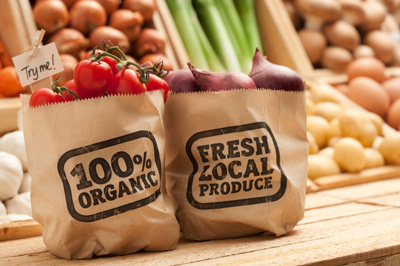The Grocery Shopper’s Dilemma—why buy organic?
Permanent link All Posts
"I read three papers a day and watch the news constantly, I would know if there's something to organic food." That's what my dad said while we were discussing the merits of organic food. I know that organic food uses less pesticide, no synthetic pesticides, and no antibiotics -- but are those reasons enough to buy organic?
I buy a few things organic and I was starting to wonder, was my dad right? The main things I buy organic are the dirty dozen, which you can find on a list the EWG puts out each year. They also list the clean 15, which are generally foods with thick skin that you do not eat, like avocados.
There are a ton of articles on the topic, but who to trust? Monsanto, the largest manufacturer of seeds and pesticides, pays universities to conduct studies on many things, like safety of pesticides. On the other side of the spectrum are organic advocates that also conduct studies. So, who do you believe?
I did a lot of research and reading on the subject, but for further clarification I spoke with Robin Levy Brown, a friend and nutritionist who works for the Midwest Dairy Council and previously worked for the Chicago Public School systems. Like many articles I read, she said ideally buying local is best. It's the freshest food and travels the least amount of miles to get to you, so it's also environmentally friendly.
I also asked Robin about meat. A lot of articles I came across, like this one, talk about buying organic meat because 80% of all medicine in the US is given to livestock, and that might be the reason drugs are less effective on people. According to Robin, dairy cows given drugs are taken off the lot until they are tested and there is no sign of drugs in their system. Organic farms have to sell an animal when it gets sick. The Natural Resources Defense Council (NRDC) says that farms are using drugs to make their animals gain weight faster (and in the case of dairy, produce more milk), and they are working to get the FDA to close loopholes allowing this practice to happen.
If you have been in a store lately you might have seen, rBST free meat and dairy available. rBST is a drug Monsanto produced to help cows grow faster, it's basically a synthetic growth hormone. Food labeled rBST free is not necessarily organic but it is free of growth hormones. Robin did calm my fears when she said rBST has no effect on the human body. It is not recognized by the human body and is completely destroyed by our digestive tracts.
Getting back to vegetables, do we need to spend the extra money on organics? Having fewer pesticides is good for the soil and in theory better for consumption. Of course organic farms still use pesticides and fungicide but they have to be natural (which may or may not be safer -- for a closer look checkout this article in Scientific American).
Are you confused? Have you come to your own conclusion? After reading way more than I had anticipated -- and since I'm not an expert -- I have come to the personal decision to do the following:
- Buy local first
- Buy a few organic produce items
- Buy organic or rBST free meat
- Keep reading
- Plant my own garden
Hungry for additional resources? Contact Ron at ronkrit@juf.org.



.jpg)



